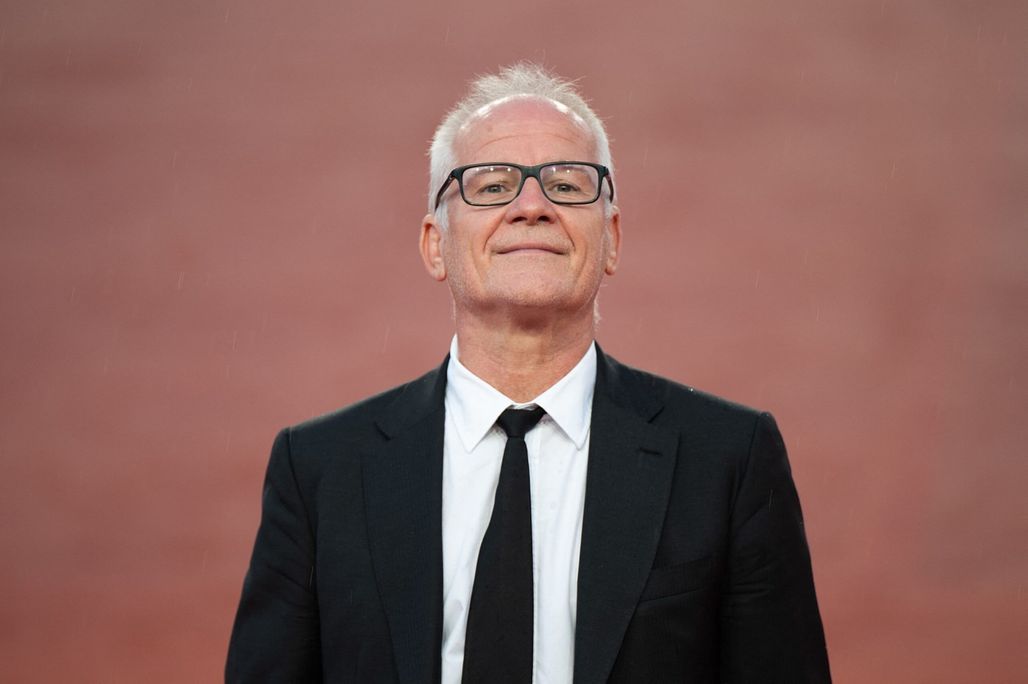
By Elsa Kesslasky – published in Variety, Wednesday April 3, 2024.
With one week to go before the press conference unveiling the 77th Cannes Film Festival Official Selection, director Thierry Fremaux is pledging to remain zen — despite wrestling with submission delays, reverberations of Hollywood’s double strikes and high expectations after last year’s edition unveiled Oscar winners Anatomy of a Fall and The Zone of Interest.
This year’s edition is already heating up, with George Miller’s Furiosa: A Mad Max Saga confirmed to premiere at the festival and Quentin Dupieux’s A Second Act, starring Léa Seydoux, set as the opening night film.
In his first and only interview ahead of the lineup reveal, Fremaux tells Variety all about this year’s edition, including his hopes to welcome back Francis Ford Coppola with Megalopolis and Yorgos Lanthimos with Kinds of Kindness, his appeal to Ted Sarandos to lure Netflix back on the Croisette, his stance on France’s new #MeToo reckoning, the presence of female directors at the festival and how geopolitical turmoil may shape the Official Selection.
Last year was a milestone year for the Cannes Film Festival. How did you approach this year’s lineup, and how many films have been selected so far?
The unanimous feedback we got is that 2023 was a really great year. Because 2022 was also successful, we weren’t sure we could do as well in 2023. Yet, it turned out to surpass all our hopes. Cinema always delivers nice surprises. We’re still at work. And each year, it’s the same mix of excitement and worry.
Right now, we still have a long way to go. Films are arriving later and later and the last choices are the most important. We have to avoid being overly impatient. We’re seeing a 20% rise in accreditation requests. We’re going to surpass the 2,000 films submitted for the selection. The interest for the festival is clear, and no matter what, it’s the films that create the atmosphere each year.
Quentin Dupieux’s film A Second Act will open this year’s festival. What was behind that decision?
Quentin Dupieux is part of the new generation of French cinema. He’s both an auteur with his own imagination and an artist who looks toward the general audience. And it’s a comedy which, because it’s about cinema, is the perfect film to take you on board for two weeks of pleasure in theaters. It’s still a French film, as we haven’t been offered any international ones. Remember that the opening film must be released in French cinemas on the same day as it is presented at Cannes.
Did you observe the impact of the Hollywood strikes on the volume of films, particularly U.S. films, submitted this year? Could that influence the number of big films, notably from studios, that will be presented?
Undeniably. I began to realize late last year the sizable impact of the strikes, which, by the way, resulted from a reflection that everyone deems important and necessary in the face of the world’s transformations. We’re seeing fewer American films than in previous years. That will undoubtedly be reflected in the final selection. We all know that 2024 is a bit of a “gap year” for American cinema, at least in the first semester. I went to Los Angeles twice this winter and felt that everybody was already looking at 2025. Lots of U.S. productions that were initially planned for 2024 will be released in 2025. But American cinema will still be very present in Cannes this year.
How so?
The big film of spring 2024 is Furiosa and it will play at Cannes. Warner has always been extremely loyal toward the Cannes Film Festival. Selfishly, I would have liked the studio to wait until Cannes to unveil Dune 2 to the world, but I understand that it was important for them to release it at the beginning of the year since it had already been pushed back this fall. In any case, there isn’t a decline of interest in the Cannes Film Festival and cinema in general, and it’s more a question of a limited number of films ready.
And this year’s Cannes will also be presided over by an American filmmaker, Greta Gerwig.
Absolutely. [Cannes President] Iris Knobloch and I are happy that Greta Gerwig accepted our invitation. She embodies perfectly the spirit of the Cannes Film Festival through her passion for cinema and her brilliant path in both the arthouse and Hollywood landscapes. To me, Greta Gerwig possesses the creativity and the open-mindedness of a generation of artists who are bending the codes. All this makes her an ideal jury president.
I know you would like Megalopolis to play at Cannes. Are you talking to Francis Ford Coppola?
I’ve known Francis since the centenary of cinema in 1995, and when I had my first year at Cannes, he came to present Apocalypse Now Redux — a huge souvenir. Since then, we’ve always stayed in touch, and recently, he received the Lumiere Prize in 2019 (Fremaux’s festival in Lyon). He’s a man who survived all the battles, and yet he has kept an appetite for life and for cinema that is extraordinarily stimulating. Megalopolis is a project that he wanted to achieve for so long and he did it independently, in his own way, as an artist. He built the legend of the Cannes Film Festival and it would be an honor to welcome him back, as a filmmaker who comes to present his new film.
Emma Stone just won the Oscar for best actress for her role in Poor Things. Will Kinds of Kindness be shown in Cannes?
Last year, Poor Things was almost ready for Cannes and I watched with great pleasure the magnificent career it had. In the new generation of world auteurs, Yórgos Lánthimos matters enormously. He’s one of the best, one of the most creatives and unpredictable. We’re happy to have welcomed at Cannes very early in his career with Canines. He also served on the jury. I would like to welcome him again very much.
Foreign-language films Anatomy of a Fall and The Zone of Interest were nominated in the best picture category at the Oscars. What do you think of that?
We talked about this last year and my position sparked some discussions. Perhaps I’m conservative, but I still think that the best picture Oscar should be reserved for American films, just like the best film at the Cesar Awards honor the best French film (it was the case again this year with Anatomy of a Fall) and the Goya honor the best Spanish film. These awards are important and can strengthen national productions as well as stimulate film industries in each country. I admire enormously the political positions of the Academy and their willingness to open themselves up to the world. But for non-American films there is the best international feature film category, which is an extremely prestigious reward. It’s equally great that these films are being nominated in other categories. Anyway, that’s only my opinion. I love the Oscars, and I also love the Golden Globes where I was present, too.
What do you think about the fact that Anatomy of a Fall wasn’t selected to represent France at the Oscars?
It’s already an old story. Above all, I regret that [The Taste of Things] failed to be nominated as one of the five best international features. It’s a beautiful film, which won a prize at Cannes and deserved to be at the Oscars. Yet, when we see the awesome destiny of Anatomy of a Fall with all these nominations, we can say that it had a great shot. But The Zone of Interest is a fantastic winner. So we’re back to our initial conclusion — 2023 was a grand year for cinema.
Do you believe that Cannes’ rule that every film in competition must come out in theaters will evolve?
It’s a decision that has to be taken by the board. But it’s a good rule: We favor films that come out in theaters because France is a great country for cinema and must remain a great country for theatrical exhibition. The Cannes Film Festival is about films in theaters. We can also welcome films from other supports. A “platform” film is still a film, but if it doesn’t come out in theaters it’s different — and if it’s different, it’s being treated differently when it comes to the competition. But being out of competition is another way, equally as spectacular [as the competition], to be present at Cannes. In the world, people congratulate us for fighting for movie theaters and we’re proud of that. But we also want streaming services to feel at home at Cannes. We’re in constant dialogue with them.
Could Netflix return to Cannes?
I hope so. Netflix is welcome on the Croisette and nothing forbids their presence. They could have a beautiful festival by being, for instance, out of competition. I’m making an appeal to my friend Ted once again. Come back!
Do you talk to other streamers?
Yes, we talk to others like Amazon and Apple. Apple can’t wait to be back; Killers of the Flower Moon with Martin Scorsese was spectacular and Tim Cook honored us by being present. It was important to have him there. What matters to us is cinema and all those who work to give it its prestige. The fact that companies like Amazon and Apple invest in cinema is very good news. During the pandemic, we heard a lot of stupid things about the so-called “death of cinema.” But there’s no such thing. It’s more alive than ever.
Do you take risks in your selection of films?
Choosing a film is always taking a risk, especially since choosing a film means renouncing another one — this year, there are more than 2,000 films submitted. And I’ll say it again, we see them all. You won’t believe me but we, like filmmakers, never know how a film will be received before the first screening. It’s what makes Cannes magical.
The selection is made by the selection committee, and then by the press and the public. It’s the gaze of critics and spectators that builds the prestige of films. What guides us isn’t “I like” or “I don’t like,” and even less “it’s good” or “it’s not good.” What guides us is, “Should this film be presented at Cannes or not?” or “Will a presentation at Cannes be beneficial for this film?” or “What does the selection of this film say about the state of world cinema?” The Official Selection gives, year after year, a strong indication of what cinema has become, its changes, evolutions and what remains immutable. It’s as important to make aesthetic discoveries as it is to show films that will have an audience right away. Because the Official Selection goes well beyond the competition.
Will there be a greater number of female directors in competition?
I expected this question because it’s pertinent. The place of female directors in the film world has hugely increased in recent years and they’re more and more. We must be attentive so that it remains the case. At Cannes, whenever we hesitate between two films, we always choose the film directed by a women filmmaker because they’re not as many as male directors. But as we know, a festival is only the reflection of a general situation, and there’ll be more female directors at Cannes if we favor their emergence everywhere in the world and especially in film schools.
The Berlin Film Festival was very politicized this year. Do you think being political is the role of a festival?
I can’t talk about the Berlinale without saluting the work of Mariette Rissenbeek and Carlo Chatrian, who are stepping down. I wish the best to Tricia Tuttle, who is succeeding them. A festival is always political through the movies it shows, through the the voices of artists who have to express themselves freely. That’s what matters the most. When movies are political, festivals are political. And when they’re romantic, festivals are romantic too. They really are. Since 1946 when Roma città aperta or The Battle of the Rails was awarded prizes right after the Second World War, we saw that the Cannes Film Festival never stopped shining a light on films that reflect the state of the world. The juries gave two Palme d’or to the Dardenne brothers, two Palme d’or to Ken Loach, one to Wajda during the Polish crisis in 1981, and one to Michael Moore, who denounced the war in Iraq in 2004. M*A*S*H*, winner of the Palme d’or in 1970, was a great political film too. A festival is meant to serve artists, who always end up exposing the world unfolding.
France is going through a #MeToo reckoning at the moment. How do think this movement can shape French cinema?
It’s been a very strong shockwave and the impact is very strong. #MeToo was and still is a world movement that resonated and continues to resonate in France. In each country, mentalities evolve, the film industry evolves at the same time as our society and it’s fortunate. There have been numerous testimonies, the one of Adèle Haenel, which triggered many things, and more recently, the one by Judith Godrèche. There are also associations that give us necessary insight and actresses that tell us crazy things that happened on certain shoots. We’re always listening and remain extremely attentive about what’s happening today to measure the past, which now seems extremely troubled. The uproar of the younger generation is strong. The collective awareness is permanent. In France, the film world is at the forefront of the debate. But let’s not believe that the rest of society doesn’t have to interrogate itself.
Are you going to take steps to avoid selecting films by people who are being accused of sexual misconduct?
There’s an ongoing reflection on this matter in France. The director is primarily responsible for a film in France, which has emphasized the importance of the “auteur of a film” for the last 50 years. But a film is also a collective work. Dozens of people allow a film to exist and thrive. Should we, because a member of a group faces an accusation, penalize the entire group? Penalize a film that brought together artists, producers and crew members? Because police investigations leak in the press and social networks, it amplifies their echo and doesn’t facilitate a serene and careful decision process. A festival can do many things, but it can’t and shouldn’t substitute itself to the justice system. The presumption of innocence remains a fundamental value, as is the attention that we owe to the testimonies of victims.
Many people were outraged about the presence of Johnny Depp on opening night last year. Would you do it again?
Believe it or not, we had not measured the impact and turmoil that the presence of Johnny Depp would cause. The opening film must come out the same day in French theaters — it was the case for Jeanne du Barry. Maiwenn, who had received several prizes at Cannes before, is part of Cannes’ family, she’s a talented filmmaker. We loved her film. That justified its presence in the selection.
You sometimes make decisions that are perceived as not “politically correct.” Why?
I don’t know what you’re referring to because all this is very subjective. Cannes is a French festival that comes from a culture and history that have their own roots. I don’t make any decisions alone. As anyone who has a sense of responsibility, I work very collectively. The richness of Cannes is a wonderful team and an administration board who is active and scrupulous, headed by a president who plays a precious role. We have no desire to seem “politically incorrect.” An edition of the Cannes Film Festival is never peaceful, because life isn’t either, but we never seek provocation — apart from what’s on screen.
Could we see any Israeli or Palestinian films in the Official Selection?
Nothing forbids it. Israeli and Palestinian filmmakers, like intellectuals from these two countries in general, are traditionally favorable to a dialogue and those whom I know are calling for an end of the conflict and the opening of negotiations.
Thanks to Variety



